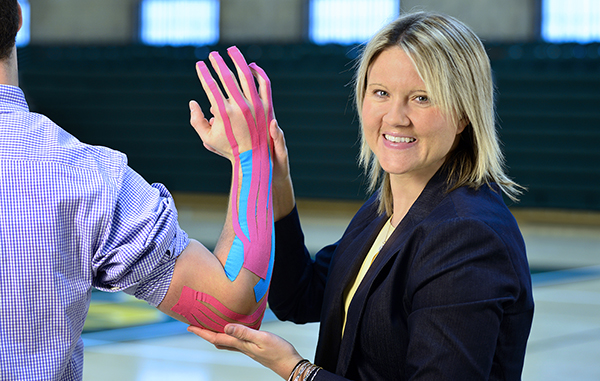RESEARCH UNIVERSITY
NDSU expert is at the forefront of athletic training research
Published January 2016

On Tuesday nights, Bentson Bunker Fieldhouse is a busy place as students have the kind of hands-on experience that is common at NDSU. Athletic training graduate students learn taping techniques, try them out on each other and research the effects of their work with a faculty member.
These students don’t use ordinary athletic tape and techniques, though. Instead, they use the increasingly popular kinesio tape because of the expertise of assistant professor Katie Lyman. She is a certified kinesio taping faculty member and top researcher in the field. Students in her three-credit graduate course become certified kinesio taping practitioners upon course completion.
Medical practitioners and athletes use kinesio tape to treat many conditions, such as muscle strains, joint pain and swelling. The cotton-like, elastic tape reduces pain and increases circulation. Certain methods and techniques should be followed in order for the tape to be most effective, which NDSU students learn in Lyman’s course.
It’s part of a unique educational experience. NDSU has the only graduate-level athletic training program in the world, and it is one of 12 universities in the world approved to provide kinesio taping certification as part of the curriculum. Students become experts in professional methods and techniques in the competitive athletic training field.
Kinesio tape has been around since the 1980s, but it took off after the 2008 Olympics. American beach volleyball player Kerri Walsh wore the colored tape during matches and ultimately won the gold medal with her teammate.
Lyman was already familiar with the product and knew of its benefits. After all, kinesio tape saved her running career. Lyman’s kinesio taping certification instructor helped her apply the tape using a technique to treat knee pain.
“I went for a run the very next day with the tape applied, and I went from having debilitating knee pain to no pain at all,” said Lyman.
Lyman is now at the forefront of kinesio taping research. She studied the effects of kinesio taping in astronauts, as some experience lower-back pain following spaceflight missions.
“We found that by applying kinesio tape on leg muscles, we were able to reduce the amount of muscle activity in the back,” said Lyman. “We typically think of using kinesio tape in the field of athletics. However, astronauts perform complex skills similar to athletes.”
The study was partially funded by NASA. Lyman presented her research at the 30th Kinesio Taping Association International Research Symposium held in Tokyo in November.
NDSU’s diagnostic ultrasound program, under the guidance of professor Kara Gange, has been a great partnership for Lyman and her research.
“Combining kinesio tape with diagnostic ultrasound provides clinicians with real-time information about the effectiveness of the tape when it’s applied for a certain condition,” said Lyman. “We hope to continue the research in order to assist with clinical decision making.”
The athletic training program is part of NDSU’s College of Human Development and Education. Spring semester 2016 marks the second year of the kinesio taping class and accreditation.